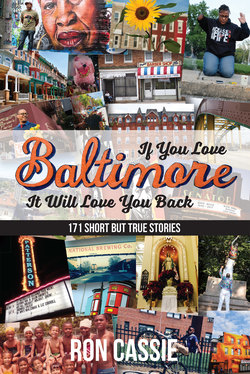Читать книгу If You Love Baltimore, It Will Love You Back - Ron Cassie - Страница 43
На сайте Литреса книга снята с продажи.
ОглавлениеDowntown
West Pratt Street
July 1, 2013
33. Setting Precedent
In the garage beneath the downtown law offices of Shapiro Sher Guinot & Sandler, Larry Gibson lifts a piece of luggage loaded with hardcover copies of his award-winning book, Young Thurgood, from his trunk. He intends to wheel the heavy bag up Charles Street to the city courthouse for a book signing with local bar association members. But first, the 71-year-old Gibson chats with a parking attendant, who wants the attorney to present his book to his church.
“I’m saving the last day in June for you,” says Gibson, nodding. “Let’s get it confirmed. The calendar’s filling up.”
By his count, Gibson has done 44 signings since the book’s release last December. Walking north past the Hotel Monaco, he stops and notes that this is the old headquarters of the Baltimore & Ohio Railroad—the company name still engraved over the archway—for which the future Supreme Court Justice Thurgood Marshall and his father once worked as dining-car waiters.
Weaving through traffic, Gibson, without hint of resentment, recalls his own experiences growing up in segregated Baltimore, such as getting kicked out of a recreation center with his older brother and cousin. “We were leading both the Ping-Pong and pool tournaments,” he says, laughing. “That’s what made me mad.” He talks about setting pins at Stoneleigh’s duckpin lanes—“where I wasn’t allowed to roll a ball”—and working on a bakery truck as a teenager. “We made deliveries to places, like Highlandtown, that I didn’t know existed, and I thought I knew every neighborhood in Baltimore,” Gibson says, with another laugh. “We also delivered different kinds of bread, like pumpernickel, that I’d never seen.
“Before I went to work in the Carter Administration, for a background check, they asked for all my addresses, and I realized we moved every 18 months,” he continues. “Of course, I’d only known all the black neighborhoods.”
In 1956, however—two years after Marshall, a Baltimore native, won the landmark Brown v. Board of Education desegregation decision—Gibson entered City College high school. Voted the storied institution’s first African-American class officer, he moved on to Howard University, becoming a student civil-rights leader, motivated, he says, by a basic desire to “fully participate” in life. After Columbia Law School, he was the first “negro,” as the Baltimore News-American reported, appointed to clerk for a federal judge in Maryland in 1967.
And then Gibson clerked for Venable, Baetjer & Howard, one of the state’s two biggest law firms. His goal at the time was to buy his parents, a janitor and a cook, a house. He recalls that period now, before his presentation in the courthouse’s Barr Library, where he spent long hours researching cases as a Venable clerk—and where he was diligently working when he learned Rev. Martin Luther King, Jr. had been shot.
With Baltimore convulsed in riots following King’s assassination, Gibson instead decided to join the city’s top black law firm, Brown, Allen, Watts, Murphy & Russell, and immediately set out to elect the first black leaders—including two of those partners listed above—to citywide offices. Quickly developing a reputation as a high-energy, no-holds-barred, grassroots organizer, Gibson served as campaign manager for Joseph Howard, who became the first black judge on the Baltimore City Supreme Bench and the first African-American to win a citywide seat in the fall of 1968—just seven months after King’s death. In the next election cycle, Gibson directed the campaigns of Milton Allen, the first African-American elected Baltimore State’s Attorney—and the first to hold a chief prosecutor’s position in a major U.S. city—and William Murphy, who won a Municipal Court judgeship. Paul Chester, whose campaign Gibson also directed, became the first African-American circuit-court clerk the same year, 1970.
Finally, the young organizer and his law firm supported Parren Mitchell, who became the first African-American from Maryland elected to Congress in 1970. In two years, the color of Baltimore’s political landscape had begun a transformation.
“I had every intention of working for Venable; there was an expectation that I would. But then Martin Luther King was shot and I’m thinking, ‘Why am I going to work for the establishment?’” Gibson says. “And I changed my mind.”
